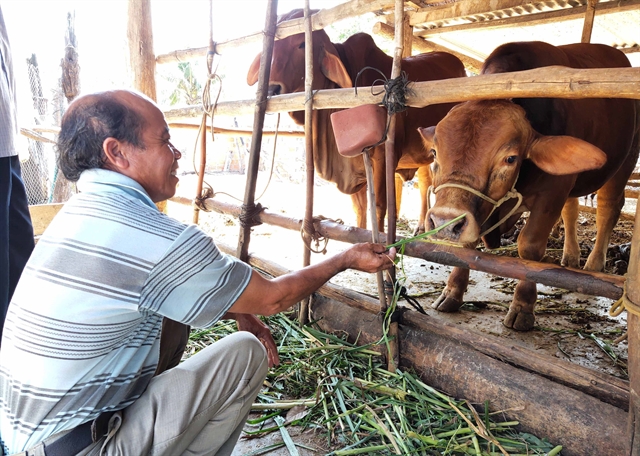 Society
Society

Gia Lai Province, which has the largest beef cattle herd in the Tây Nguyên (Central Highlands) region, has undertaken many programmes to develop the quality of its animals by crossing native cows and hybrid bulls.

|
| Breeding high-quality crossbred cattle in Gia Lai Province’s Krông Pa District. — VNA/VNS Photo Dư Toán |
GIA LAI — Gia Lai Province, which has the largest beef cattle herd in the Tây Nguyên (Central Highlands) region, has undertaken many programmes to develop the quality of its animals by crossing native cows and hybrid bulls.
Gia Lai has nearly 400,000 head, accounting for nearly 50 per cent of the region’s total, according to the province’s Agriculture Extension Centre.
But the number of crossbred cattle accounts for only around 30 per cent.
In Krông Pa District, which has more than 62,000 head, the largest number in the province, the rate of crossbred cattle is only 20 per cent. Most of them are bred by ethnic minority people using traditional farming methods which rely on natural foods, meaning the breeding efficiency is modest.
In October 2017, the Western Highlands Agriculture and Forestry Science Institute (WASI) launched a project to develop high-quality beef cattle in Krông Pa, seeking to ensure there are 3,000 crossbred animals by October 2020.
The crossbreed animals are created by crossing native species with varieties like brahman, red angus, droughmaster, and Sind.
The project has taught farmers cattle-breeding techniques and about models for crossbreeding to produce calves.
Mai Văn Xuân, who has been raising cattle in Krông Pa District’s Ia Rsươm Commune since 1984, has switched from breeding native cattle to crossbreeds after participating in the project.
He now breeds red angus beef cattle and gets financial support from the project to repair cattle pens and buy bran to feed his calves.
A native calf reaches a weight of only 100 kilogrammes after one year while a crossbred calf can reach 350kg, he said.
The rate of pure meat of Reed Angus is 52-56 per cent while the rate of pure meat of native cattle is only 30-35 per cent, according to WASI.
Tôn Thất Dạ Vũ of WASI said to develop high-quality beef cattle in Krông Pa and other localities, the province should continue to use artificial insemination to cross-breed and create techniques for raising animals from birth until 18 months based on the food available.
It needs to raise farmers’ awareness of advanced techniques to improve the quality of cattle and develop food sources for crossbred cattle through training courses and seminars, he said.
A province project to use artificial insemination to breed cross-breed cattle has yielded more than 6,000 doses of free frozen semen to inseminate cows since October 2018, which have produced more than 4,000 hybrid calves.
Trịnh Quốc Việt, director of the province’s Agriculture Extension Centre, said the project would provide 10,000 semen samples by the end of next year.
The province would continue to have programmes after 2020 to further develop crossbred cattle, he said.
“In ethnic minority areas, we regularly tell farmers about the benefits of cross-breeding cattle.”
Gia Lai has favourable natural conditions and abundant food sources for cattle.
More crossbred cattle
Đak Pơ District has 15,322 head of cattle, 87 per cent of them crossbred varieties, making it the district with the highest rate of crossbred cattle in the province.
Nguyễn Văn Hương in Đak Pơ’s An Thành Commune received soft loans in 2017 from the district’s Farmers Association for buying a cross-bred cow for producing calves.
It has delivered two calves, he said.
A six-month old cross-bred calf can fetch VNĐ11-13 million (US$470-560), 1.5 times the price of a native calf, he said.
Đak Pơ has provided crossbred cows and bulls to farmers through various programmes, including those of its Farmers Association and the national target programme on sustainable poverty reduction.
Đak Pơ has spent VNĐ1.2 billion ($51,600) to provide 72 zebu cows to poor farmers this year.
Huỳnh Văn Hơn, deputy chairman of the Đak Pơ District People’s Committee, said: “The district will continue to support and encourage farmers to improve the quality of cattle to increase incomes.”
The district targets to increase the rate of its crossbred cattle to close to 100 per cent by the end of next year, he added. — VNS




